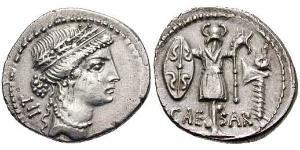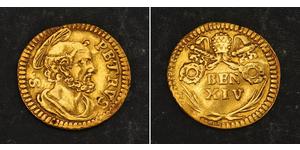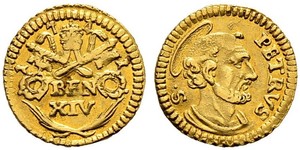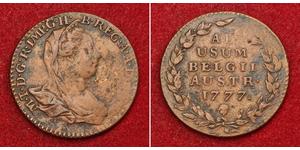1 Denarius Roman Republic (509BC-27BC) Silver Mark Antony (83BC-30BC)
Metal:
State:
Issue year(s):
32BC - 31BC
Marc Antony, AR Denarius, 32-31 BC, Mint moving with Marc Antony
ANT . AVG / III . VIR . R . P . C
Praetorian galley right, scepter tied with fillet on prowLEG | II
Aquila between two legionary standards
16mm x 18mm, 3.48gThese denarii are of baser metal than the ordinary currency of the time and might be described as “money of necessity.” The Battle of Actium was the decisive confrontation of the Final War of the Roman Republic. It was fought between the forces of Octavian and the combined forces of Mark Antony and Cleopatra. The battle took place on 2 September 31 BC, on the Ionian Sea near the Roman colony of Actium in Greece. Octavian’s fleet was commanded by Marcus Vipsanius Agrippa, while Antony’s fleet was supported by the ships of his beloved, Cleopatra VII, Queen of Ptolemaic Egypt. Octavian’s victory enabled him to consolidate his power over Rome and its dominions. To that end, he adopted the title of Princeps (“first citizen”) and as a result of the victory was awarded the title of Augustus by the Roman Senate. As Augustus, he would retain the trappings of a restored Republican leader; however, historians generally view this consolidation of power and the adoption of these honorifics as the end of the Roman Republic and the beginning of the Roman Empire. Marcus Antonius (in Latin: M·ANTONIVS·M·F·M·N) (c. January 14, 83 BC–August 1, 30 BC), known in English as Mark Antony, was a Roman politician and General. He was an important supporter and the loyal friend of Gaius Julius Caesar as a military commander and administrator, being Caesar’s second cousin, once removed, by his mother Julia Antonia. After Caesar’s assassination, Antony formed an official political alliance with Octavian (Augustus) and Marcus Aemilius Lepidus, known to historians today as the Second Triumvirate. The triumvirate broke up in 33 BC. Disagreement between Octavian and Antony erupted into civil war, the Final War of the Roman Republic, in 31 BC. Antony was defeated by Octavian at the naval Battle of Actium, and in a brief land battle at Alexandria. He committed suicide, and his lover, Cleopatra, killed herself shortly thereafter.
43
coins in the group
View all coins in the group
View all coins in the group
(2705 X 1300 pixels, file size: ~502K)
Posted by: anonymous 2024-04-07
Marc Antony AR Denarius Silver Roman Coin 32-31 BC - Certified ANACS VF20
(2069 X 1013 pixels, file size: ~482K)
Posted by: anonymous 2024-04-07
Marc Antony AR Denarius Silver Galley Coin 32 BC - Certified NGC XF (EF)
(1902 X 998 pixels, file size: ~450K)
Posted by: anonymous 2024-04-07
Marc Antony AR Denarius Silver Galley Coin 32 BC - Certified NGC Choice AU
(1945 X 1007 pixels, file size: ~462K)
Posted by: anonymous 2024-04-07
Marc Antony AR Denarius Silver Galley Coin 32 BC - NGC Choice XF - 5/5 Strike!
(1971 X 1001 pixels, file size: ~443K)
Posted by: anonymous 2024-04-07
Marc Antony AR Denarius Silver Galley Coin 32 BC - Certified NGC AU - Rare in AU
(1872 X 1023 pixels, file size: ~433K)
Posted by: anonymous 2024-04-07
Marc Antony AR Denarius Silver Galley Coin 32 BC - Certified NGC AU - Rare in AU
You may be interested in following coins
2025-05-24
- New coin is added to 1/2 Scudo Vatican Gold
1/2 Scudo Vatican Gold
group has 5 coins / 5 prices
⇑
ITALIA Vaticano - Stato Pontificio Benedetto XIV. 1740-1758. 1/2 Scudo romano 1741, Roma. 0.91 g. Berman 2735. Fr. 233. BB+.
2025-05-25
- New coin is added to 2 Liard Austrian Netherlands (1713-1795) Copper
2 Liard Austrian Netherlands (1713-1795) Copper
group has 3 coins / 3 prices
⇑
1777, Austrian Netherlands, Maria Theresa. Copper 2 Liards (2 Oorden) Coin. VF- Mint Year: 1777 Reference: KM-29. Denomination: 2 Liards (2 Oorden) Mint Place: Brussels (cupid´s head) ...
You may be interested in ...

-500-250-1r8Kbzbi6UoAAAFLwRmjltgt.jpg)
-300-150-3_6sHgTyZ5YAAAGObfFb_LnJ.jpg)
-300-150-wzSsHgTyrE0AAAGO5K1b_Ln_.jpg)
-300-150-NIqsHgTyBwYAAAGOJQZb_Lny.jpg)
-300-150-1BusHgTym84AAAGO6J5b_Lnw.jpg)
-300-150-EhCsHgTy2O4AAAGOSCVb_Lnv.jpg)
-300-150-OYOsHgTyZEoAAAGOzx9b_Lnu.jpg)








-300-150-zTgKbzbixN4AAAFSpQBzJO3T.jpg)






